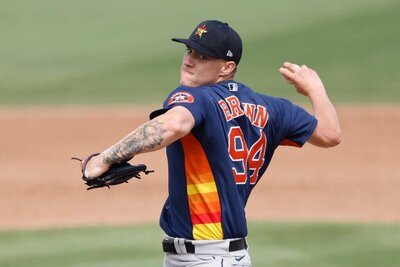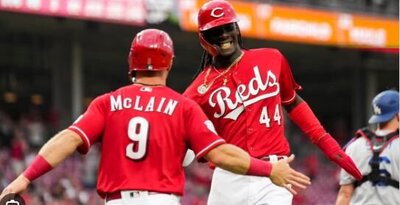Chris Archer (TB) - Chris Archer was again burned by the long ball in a loss to the Orioles on Friday night as he fell to 4-13 on the season. Archer gave up homeruns to Pedro Alvarez and Jonathan Schoop and now has allowed 20 on the year, just 1 shy of the major-league leading Ian Kennedy and Max Scherzer. The strikeouts continue to be there for Archer and his control, while worse than last year, isn't the root of all his issues. The problem lies in the fact that his fastball and change-up have simply lost their effectiveness and he's throwing both pitches more this season. Based on pitch values, his fastball had never had a negative wFB/c value before this season (-1.25 currently) and his change-up again dropped to -1.02 wCH/c this season after sitting at 0.36 last year. Why? I believe it can partially be driven by the erosion of his velocity differential between the two pitches. Last season, his fastball average 95 MPH while his change-up consistently sat around 85 MPH, or a 10 MPH differential. This year, his fastball is 94 MPH while his change-up is around 87 MPH. A 7 MPH differential isn't going to be enough fool batters and it's showing right now.
Michael Pineda (NYY) - Michael Pineda had a forgettable start on Friday night, serving up 3 homeruns in a loss to Boston at home in the Bronx. Pineda's final line was 5 IP, 5H, 5ER, 1BB, and 6 K, with all 5 runs he allowed coming via the long ball. The poor showing places Pineda tied for 9th in the major league with 18 home runs allowed. The total also places him just 3 shy of his career high set last year. So what has changed? The answer is "not much". While he has allowed slightly more flyballs than last year (33% vs 30%), his flyball percentage still remains lower than his career mark. So are batters making harder contact when they do hit it in the air? The answer there is also "not really". Pineda's hard hit allowed is hovering right around 30%, the exact same spot he was last year. With this in mind, there's very little reason to think his 19% HR/FB rate this year in inflated due to a skillset change. More likely, it means he's suffering from a bit of bad luck that should eventually regress by closer to his 11% career mark. After all, Pineda only allowed 3 flyballs tonight and all 3 left the yard.
Mike Napoli (CLE) - Mike Napoli picked up right where he left off before the All-Star Break by going 3-for-4 with a homerun and 3 runs scored in a win over Minnesota on Friday. Napoli is enjoying his 9th straight season with 17 or more homeruns and is currently on pace to drive in more homeruns than his career high of 92 that he hit with the Red Sox in 2013. While he doesn't have the same raw power that he showed with the Rangers in 2011 (.312 ISO that year vs .230 this season), he is flirting with a .250 batting average, a mark he has surpassed only 4 times in his career and would be his first time since 2013.
Carlos Carrasco (CLE) - We're so used to Carrasco rolling off really impressive outings that when he comes in with a line like Friday night, we're all disappointed. In reality, Carrasco's line of 6.2IP, 4H, 2ER, 1BB, and 3K is very good and left him in line to get the win over the power-laden Twins offense. Disappointing part of his night, of course, was the 3 strikeouts. After back-to-back years of swinging strike rate at elite 13-14% levels, Carrasco's getting batters to swing and miss on pitches just 11.5%. That's a big reason we have seen his strikeout rate fall below 25% for the first time since 2013. Is it possible his hamstring injury is still bothering him or caused him to change his mechanics? Sure, but it also looks like a pitcher who is changing his approach. Carrasco's pitch deployment has changed a bit this year with the righty using his curveball a little more and his slider a little less. That's an important thing to note because he has historically generated whiffs on his slider about twice as often than with his curveball, yet his curveball has actually had a higher pitch value than his slider over the last 2 years. This just speaks to Carrasco's development as a starting pitcher and the fact that he has learned to trade in a few strikeouts for more efficient and effective outings (see his career best 2.49 ERA).
Ian Kinsler (DET) - Ian Kinsler had a nice night at the plate going 2-for-4 with his 17th homerun in the first inning against Ian Kennedy. It was the only damage that the Tigers would get against the Royals' starting pitcher all night before taking the lead off the Kansas City bullpen. Kinsler's homerun total places him second among all AL second basemen in homeruns. Now 34 years old, Kinsler has begun to show some signs of age decline (6% drop in contact%, 2% increase in SwStr%, 6% jump in K%), but his power numbers are the highest he has shown since 2009 and 2011. Kinsler looks to be like a nice value in DFS tomorrow at just $3,500 on FanDuel and $4,100 as he goes up against the left-handed Danny Duffy. Against LHP this season, the second baseman has a .396 wOBA, .216 ISO and 148 wRC+.
| AL DFS Value Plays - July 16, 2016 | ||||
| Position | Player | FD Price | DK Price | FA Price |
| C | Salvador Perez | $ 3,400 | $ 4,100 | $ 4,650 |
| 1B | Eric Hosmer | $ 3,800 | $ 3,600 | $ 5,150 |
| 2B | Ian Kinsler | $ 3,500 | $ 4,100 | $ 5,400 |
| 3B | Manny Machado | $ 3,800 | $ 4,400 | $ 5,400 |
| SS | Francisco Lindor | $ 3,600 | $ 4,200 | $ 5,150 |
| OF | Mookie Betts | $ 3,600 | $ 5,400 | $ 5,300 |
| OF | Jacoby Ellsbury | $ 3,900 | $ 3,700 | $ 4,600 |
| OF | Billy Hamilton (if 2nd) | $ 2,900 | $ 3,600 | $ 4,350 |
| SP | Matt Shoemaker | $ 8,100 | $ 7,700 | $ 6,300 |
| SP | Danny Duffy | $ 8,800 | $ 11,000 | $ 5,950 |


































